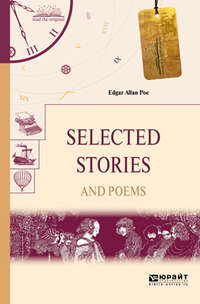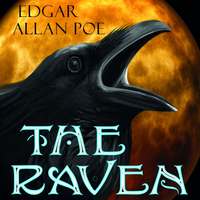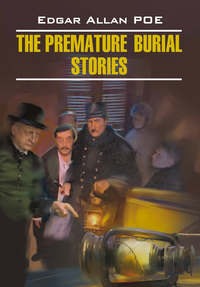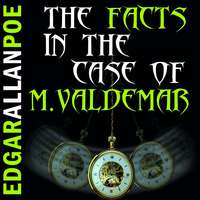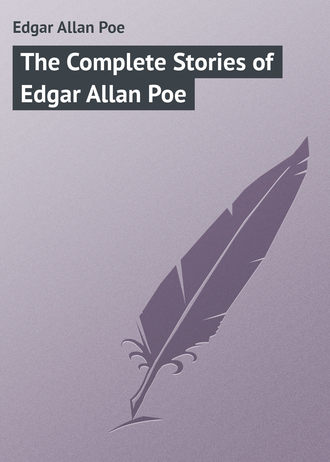 полная версия
полная версияThe Complete Stories of Edgar Allan Poe
With sentiments of perfect respect,
Your most humble servant,
JOHAN HERMANN.
To the Baron Ritzner Von Jung,
August 18th, 18—.
Not knowing what better to do, I called upon Ritzner with this epistle. He bowed as I presented it; then, with a grave countenance, motioned me to a seat. Having perused the cartel, he wrote the following reply, which I carried to Hermann.
SIR, – Through our common friend, Mr. P., I have received your note of this evening. Upon due reflection I frankly admit the propriety of the explanation you suggest. This being admitted, I still find great difficulty, (owing to the refinedly peculiar nature of our disagreement, and of the personal affront offered on my part,) in so wording what I have to say by way of apology, as to meet all the minute exigencies, and all the variable shadows of the case. I have great reliance, however, on that extreme delicacy of discrimination, in matters appertaining to the rules of etiquette, for which you have been so long and so pre-eminently distinguished. With perfect certainty, therefore, of being comprehended, I beg leave, in lieu of offering any sentiments of my own, to refer you to the opinions of Sieur Hedelin, as set forth in the ninth paragraph of the chapter of “Injuriae per applicationem, per constructionem, et per se,” in his “Duelli Lex scripta, et non; aliterque.” The nicety of your discernment in all the matters here treated, will be sufficient, I am assured, to convince you that the mere circumstance of me referring you to this admirable passage, ought to satisfy your request, as a man of honor, for explanation.
With sentiments of profound respect,
Your most obedient servant,
VON JUNG.
The Herr Johan Hermann
August 18th, 18—.
Hermann commenced the perusal of this epistle with a scowl, which, however, was converted into a smile of the most ludicrous self-complacency as he came to the rigmarole about Injuriæ per applicationem, per constructionem, et per se. Having finished reading, he begged me, with the blandest of all possible smiles, to be seated, while he made reference to the treatise in question. Turning to the passage specified, he read it with great care to himself, then closed the book, and desired me, in my character of confidential acquaintance, to express to the Baron Von Jung his exalted sense of his chivalrous behavior, and, in that of second, to assure him that the explanation offered was of the fullest, the most honorable, and the most unequivocally satisfactory nature.
Somewhat amazed at all this, I made my retreat to the Baron. He seemed to receive Hermann’s amicable letter as a matter of course, and after a few words of general conversation, went to an inner room and brought out the everlasting treatise “Duelli Lex scripta, et non; aliterque.” He handed me the volume and asked me to look over some portion of it. I did so, but to little purpose, not being able to gather the least particle of meaning. He then took the book himself, and read me a chapter aloud. To my surprise, what he read proved to be a most horribly absurd account of a duel between two baboons. He now explained the mystery; showing that the volume, as it appeared prima facie, was written upon the plan of the nonsense verses of Du Bartas; that is to say, the language was ingeniously framed so as to present to the ear all the outward signs of intelligibility, and even of profundity, while in fact not a shadow of meaning existed. The key to the whole was found in leaving out every second and third word alternately, when there appeared a series of ludicrous quizzes upon a single combat as practised in modern times.
The Baron afterwards informed me that he had purposely thrown the treatise in Hermann’s way two or three weeks before the adventure, and that he was satisfied, from the general tenor of his conversation, that he had studied it with the deepest attention, and firmly believed it to be a work of unusual merit. Upon this hint he proceeded. Hermann would have died a thousand deaths rather than acknowledge his inability to understand anything and everything in the universe that had ever been written about the duello.
LITTLETON BARRY.
THE END
Why the Little Frenchman Wears His Hand in a Sling (1837)
IT’S on my Wisiting cards sure enough (and it’s them that’s all o’ pink satin paper) that inny gintleman that plases may behould the intheristhin words, “Sir Pathrick O’Grandison, Barronitt, 39 Southampton Row, Russell Square, Parrish o’ Bloomsbury.” And shud ye be wantin’ to diskiver who is the pink of purliteness quite, and the laider of the hot tun in the houl city o’ Lonon – why it’s jist mesilf. And fait that same is no wonder at all at all, (so be plased to stop curlin your nose,) for every inch o’ the six wakes that I’ve been a gintleman, and left aff wid the bog-throthing to take up wid the Barronissy, i’ts Pathrick that’s been living like a houly imperor, and gitting the iddication and the graces. Och! and would’nt it be a blessed thing for your sperrits if ye cud lay your two peepers jist, upon Sir Pathrick O’Grandison, Barronitt, when he is all riddy drissed for the hopperer, or stipping into the Brisky for the drive into the Hyde Park. – But it’s the iligant big figgur that I ave, for the rason o’ which all the ladies fall in love wid me. Isn’t it my own swate silf now that’ll missure the six fut, and the three inches more nor that, in me stockings, and that am excadingly will proportioned all over to match? And it is ralelly more than three fut and a bit that there is, inny how, of the little ould furrener Frinchman that lives jist over the way, and that’s a oggling and a goggling the houl day, (and bad luck to him,) at the purty widdy Misthress Tracle that’s my own nixt door neighbor, (God bliss her) and a most particuller frind and acquaintance? You percave the little spalpeen is summat down in the mouth, and wears his lift hand in a sling; and it’s for that same thing, by yur lave, that I’m going to give you the good rason.
The truth of the houl matter is jist simple enough; for the very first day that I com’d from Connaught, and showd my swate little silf in the strait to the widdy, who was looking through the windy, it was a gone case althegither wid the heart o’ the purty Misthress Tracle. I percaved it, ye see, all at once, and no mistake, and that’s God’s thruth. First of all it was up wid the windy in a jiffy, and thin she threw open her two peepers to the itmost, and thin it was a little gould spy-glass that she clapped tight to one o’ them, and divil may burn me if it did’nt spake to me as plain as a peeper cud spake, and says it, through the spy-glass, “Och! the tip o’ the mornin to ye, Sir Pathrick O’Grandison, Barronitt, mavourneen; and it’s a nate gintleman that ye are, sure enough, and it’s mesilf and me forten jist that’ll be at yur sarvice, dear, inny time o’ day at all at all for the asking.” And it’s not mesilf ye wud have to be bate in the purliteness; so I made her a bow that wud ha broken yur heart althegither to behould, and thin I pulled aff me hat with a flourish, and thin I winked at her hard wid both eyes, as much as to say, “Thrue for you, yer a swate little crature, Mrs. Tracle, me darlint, and I wish I may be drownthed dead in a bog, if it’s not mesilf, Sir Pathrick O’Grandison, Barronitt, that’ll make a houl bushel o’ love to yur leddyship, in the twinkling o’ the eye of a Londonderry purraty.”
And it was the nixt mornin, sure, jist as I was making up me mind whither it wouldn’t be the purlite thing to sind a bit o’ writin to the widdy by way of a love-litter, when up cum’d the delivery servant wid an illigant card, and he tould me that the name on it (for I niver cud rade the copper-plate printin on account of being lift handed) was all about Mounseer, the Count, A Goose, Look-aisy, Maiter-di-dauns, and that the houl of the divilish lingo was the spalpeeny long name of the little ould furrener Frinchman as lived over the way.
And jist wid that in cum’d the little willian himself, and thin he made me a broth of a bow, and thin he said he had ounly taken the liberty of doing me the honor of the giving me a call, and thin he went on to palaver at a great rate, and divil the bit did I comprehind what he wud be afther the tilling me at all at all, excipting and saving that he said “pully wou, woolly wou,” and tould me, among a bushel o’ lies, bad luck to him, that he was mad for the love o’ my widdy Misthress Tracle, and that my widdy Mrs. Tracle had a puncheon for him.
At the hearin of this, ye may swear, though, I was as mad as a grasshopper, but I remimbered that I was Sir Pathrick O’Grandison, Barronitt, and that it wasn’t althegither gentaal to lit the anger git the upper hand o’ the purliteness, so I made light o’ the matter and kipt dark, and got quite sociable wid the little chap, and afther a while what did he do but ask me to go wid him to the widdy’s, saying he wud give me the feshionable inthroduction to her leddyship.
“Is it there ye are?” said I thin to mesilf, “and it’s thrue for you, Pathrick, that ye’re the fortunnittest mortal in life. We’ll soon see now whither it’s your swate silf, or whither it’s little Mounseer Maiter-di-dauns, that Misthress Tracle is head and ears in the love wid.”
Wid that we wint aff to the widdy’s, next door, and ye may well say it was an illigant place; so it was. There was a carpet all over the floor, and in one corner there was a forty-pinny and a jews-harp and the divil knows what ilse, and in another corner was a sofy, the beautifullest thing in all natur, and sitting on the sofy, sure enough, there was the swate little angel, Misthress Tracle.
“The tip o’ the morning to ye,” says I, “Mrs. Tracle,” and thin I made sich an illigant obaysance that it wud ha quite althegither bewildered the brain o’ ye.
“Wully woo, pully woo, plump in the mud,” says the little furrenner Frinchman, “and sure Mrs. Tracle,” says he, that he did, “isn’t this gintleman here jist his reverence Sir Pathrick O’Grandison, Barronitt, and isn’t he althegither and entirely the most particular frind and acquintance that I have in the houl world?”
And wid that the widdy, she gits up from the sofy, and makes the swatest curtchy nor iver was seen; and thin down she sits like an angel; and thin, by the powers, it was that little spalpeen Mounseer Maiter-di-dauns that plumped his silf right down by the right side of her. Och hon! I ixpicted the two eyes o’ me wud ha cum’d out of my head on the spot, I was so dispirate mad! Howiver, “Bait who!” says I, after a while. “Is it there ye are, Mounseer Maiter-di-dauns?” and so down I plumped on the lift side of her leddyship, to be aven wid the willain. Botheration! it wud ha done your heart good to percave the illigant double wink that I gived her jist thin right in the face wid both eyes.
But the little ould Frinchman he niver beginned to suspict me at all at all, and disperate hard it was he made the love to her leddyship. “Woully wou,” says he, “Pully wou,” says he, “Plump in the mud,” says he.
“That’s all to no use, Mounseer Frog, mavourneen,” thinks I; and I talked as hard and as fast as I could all the while, and throth it was mesilf jist that divarted her leddyship complately and intirely, by rason of the illigant conversation that I kipt up wid her all about the dear bogs of Connaught. And by and by she gived me such a swate smile, from one ind of her mouth to the ither, that it made me as bould as a pig, and I jist took hould of the ind of her little finger in the most dillikittest manner in natur, looking at her all the while out o’ the whites of my eyes.
And then ounly percave the cuteness of the swate angel, for no sooner did she obsarve that I was afther the squazing of her flipper, than she up wid it in a jiffy, and put it away behind her back, jist as much as to say, “Now thin, Sir Pathrick O’Grandison, there’s a bitther chance for ye, mavourneen, for it’s not altogether the gentaal thing to be afther the squazing of my flipper right full in the sight of that little furrenner Frinchman, Mounseer Maiter-di-dauns.”
Wid that I giv’d her a big wink jist to say, “lit Sir Pathrick alone for the likes o’ them thricks,” and thin I wint aisy to work, and you’d have died wid the divarsion to behould how cliverly I slipped my right arm betwane the back o’ the sofy, and the back of her leddyship, and there, sure enough, I found a swate little flipper all a waiting to say, “the tip o’ the mornin to ye, Sir Pathrick O’Grandison, Barronitt.” And wasn’t it mesilf, sure, that jist giv’d it the laste little bit of a squaze in the world, all in the way of a commincement, and not to be too rough wid her leddyship? and och, botheration, wasn’t it the gentaalest and dilikittest of all the little squazes that I got in return? “Blood and thunder, Sir Pathrick, mavourneen,” thinks I to mesilf, “fait it’s jist the mother’s son of you, and nobody else at all at all, that’s the handsomest and the fortunittest young bogthrotter that ever cum’d out of Connaught!” And wid that I giv’d the flipper a big squaze, and a big squaze it was, by the powers, that her leddyship giv’d to me back. But it would ha split the seven sides of you wid the laffin to behould, jist then all at once, the consated behavior of Mounseer Maiter-di-dauns. The likes o’ sich a jabbering, and a smirking, and a parley-wouing as he begin’d wid her leddyship, niver was known before upon arth; and divil may burn me if it wasn’t me own very two peepers that cotch’d him tipping her the wink out of one eye. Och, hon? if it wasn’t mesilf thin that was mad as a Kilkenny cat I shud like to be tould who it was!
“Let me infarm you, Mounseer Maiter-di-dauns,” said I, as purlite as iver ye seed, “that it’s not the gintaal thing at all at all, and not for the likes o’ you inny how, to be afther the oggling and a goggling at her leddyship in that fashion,” and jist wid that such another squaze as it was I giv’d her flipper, all as much as to say, “isn’t it Sir Pathrick now, my jewel, that’ll be able to the protecting o’ you, my darlint?” and then there cum’d another squaze back, all by way of the answer. “Thrue for you, Sir Pathrick,” it said as plain as iver a squaze said in the world, “Thrue for you, Sir Pathrick, mavourneen, and it’s a proper nate gintleman ye are – that God’s truth,” and wid that she opened her two beautiful peepers till I belaved they wud ha com’d out of her hid althegither and intirely, and she looked first as mad as a cat at Mounseer Frog, and thin as smiling as all out o’ doors at mesilf.
“Thin,” says he, the willian, “Och hon! and a wolly-wou, pully-wou,” and then wid that he shoved up his two shoulders till the divil the bit of his hid was to be diskivered, and then he let down the two corners of his purraty-trap, and thin not a haporth more of the satisfaction could I git out o’ the spalpeen.
Belave me, my jewel, it was Sir Pathrick that was unrasonable mad thin, and the more by token that the Frinchman kipt an wid his winking at the widdy; and the widdy she kipt an wid the squazing of my flipper, as much as to say, “At him again, Sir Pathrick O’Grandison, mavourneen;” so I just ripped out wid a big oath, and says I,
“Ye little spalpeeny frog of a bogthrotting son of a bloody-noun!” – and jist thin what d’ye think it was that her leddyship did? Troth she jumped up from the sofy as if she was bit, and made off through the door, while I turned my head round afther her, in a complete bewilderment and botheration, and followed her wid me two peepers. You percave I had a reason of my own for knowing that she could’nt git down the stares althegither and entirely; for I knew very well that I had hould of her hand, for the divil the bit had I iver lit it go. And says I,
“Isn’t it the laste little bit of a mistake in the world that ye’ve been afther the making, yer leddyship? Come back now, that’s a darlint, and I’ll give ye yur flipper.” But aff she wint down the stairs like a shot, and thin I turned round to the little Frinch furrenner. Och hon! if it wasn’t his spalpeeny little paw that I had hould of in my own – why thin – thin it was’nt – that’s all.
“And maybe it wasn’t mesilf that jist died then outright wid the laffin, to behold the little chap when he found out that it wasn’t the widdy at all at all that he had had hould of all the time, but only Sir Pathrick O’Grandison. The ould divil himself niver behild sich a long face as he pet an! As for Sir Pathrick O’Grandison, Barronitt, it wasn’t for the likes of his riverence to be afther the minding of a thrifle of a mistake. Ye may jist say, though (for it’s God’s thruth) that afore I left hould of the flipper of the spalpeen, (which was not till afther her leddyship’s futman had kicked us both down the stairs,) I gived it such a nate little broth of a squaze as made it all up into raspberry jam.
“Wouly-wou,” says he, “pully-wou,” says he – “Cot tam!”
And that’s jist the thruth of the rason why he wears his left hand in a sling.
LITTLETON BARRY.
THE END
How to Write a Blackwood Article (1850)
“In the name of the Prophet – figs!!”
Cry of the Turkish fig-pedler.
I presume every body has heard of me. My name is the Signora Psyche Zenobia. This I know to be a fact. Nobody but my enemies ever calls me Suky Snobbs. I have been assured that Suky is but a vulgar corruption of Psyche, which is good Greek, and means “the soul” (that’s me, I’m all soul) and sometimes “a butterfly,” which latter meaning undoubtedly alludes to my appearance in my new crimson satin dress, with the sky-blue Arabian mantelet, and the trimmings of green agraffas, and the seven flounces of orange-colored auriculas. As for Snobbs – any person who should look at me would be instantly aware that my name wasn’t Snobbs. Miss Tabitha Turnip propagated that report through sheer envy. Tabitha Turnip indeed! Oh the little wretch! But what can we expect from a turnip? Wonder if she remembers the old adage about “blood out of a turnip, &c.” [Mem: put her in mind of it the first opportunity.] [Mem. again – pull her nose.] Where was I? Ah! I have been assured that Snobbs is a mere corruption of Zenobia, and that Zenobia was a queen – (So am I. Dr. Moneypenny, always calls me the Queen of the Hearts) – and that Zenobia, as well as Psyche, is good Greek, and that my father was “a Greek,” and that consequently I have a right to our patronymic, which is Zenobia, and not by any means Snobbs. Nobody but Tabitha Turnip calls me Suky Snobbs. I am the Signora Psyche Zenobia.
As I said before, everybody has heard of me. I am that very Signora Psyche Zenobia, so justly celebrated as corresponding secretary to the “Philadelphia, Regular, Exchange, Tea, Total, Young, Belles, Lettres, Universal, Experimental, Bibliographical, Association, To, Civilize, Humanity.” Dr. Moneypenny made the title for us, and says he chose it because it sounded big like an empty rum-puncheon. (A vulgar man that sometimes – but he’s deep.) We all sign the initials of the society after our names, in the fashion of the R. S. A., Royal Society of Arts – the S. D. U. K., Society for the Diffusion of Useful Knowledge, &c, &c. Dr. Moneypenny says that S stands for stale, and that D. U. K. spells duck, (but it don’t,) and that S. D. U. K. stands for Stale Duck, and not for Lord Brougham’s society – but then Dr. Moneypenny is such a queer man that I am never sure when he is telling me the truth. At any rate we always add to our names the initials P. R. E. T. T. Y. B. L. U. E. B. A. T. C. H. – that is to say, Philadelphia, Regular, Exchange, Tea, Total, Young, Belles, Lettres, Universal, Experimental, Bibliographical, Association, To, Civilize, Humanity – one letter for each word, which is a decided improvement upon Lord Brougham. Dr. Moneypenny will have it that our initials give our true character – but for my life I can’t see what he means.
Notwithstanding the good offices of the Doctor, and the strenuous exertions of the association to get itself into notice, it met with no very great success until I joined it. The truth is, the members indulged in too flippant a tone of discussion. The papers read every Saturday evening were characterized less by depth than buffoonery. They were all whipped syllabub. There was no investigation of first causes, first principles. There was no investigation of anything at all. There was no attention paid to that great point, the “fitness of things.” In short there was no fine writing like this. It was all low – very! No profundity, no reading, no metaphysics – nothing which the learned call spirituality, and which the unlearned choose to stigmatize as cant. [Dr. M. says I ought to spell “cant” with a capital K – but I know better.]
When I joined the society it was my endeavor to introduce a better style of thinking and writing, and all the world knows how well I have succeeded. We get up as good papers now in the P. R. E. T. T. Y. B. L. U. E. B. A. T. C. H. as any to be found even in Blackwood. I say, Blackwood, because I have been assured that the finest writing, upon every subject, is to be discovered in the pages of that justly celebrated Magazine. We now take it for our model upon all themes, and are getting into rapid notice accordingly. And, after all, it’s not so very difficult a matter to compose an article of the genuine Blackwood stamp, if one only goes properly about it. Of course I don’t speak of the political articles. Everybody knows how they are managed, since Dr. Moneypenny explained it. Mr. Blackwood has a pair of tailor’s-shears, and three apprentices who stand by him for orders. One hands him the “Times,” another the “Examiner,” and a third a “Gulley’s New Compendium of Slang-Whang.” Mr. B. merely cuts out and intersperses. It is soon done – nothing but Examiner, Slang-Whang, and Times – then Times, Slang-Whang, and Examiner – and then Times, Examiner, and Slang-Whang.
But the chief merit of the Magazine lies in its miscellaneous articles; and the best of these come under the head of what Dr. Moneypenny calls the bizarreries (whatever that may mean) and what everybody else calls the intensities. This is a species of writing which I have long known how to appreciate, although it is only since my late visit to Mr. Blackwood (deputed by the society) that I have been made aware of the exact method of composition. This method is very simple, but not so much so as the politics. Upon my calling at Mr. B.‘s, and making known to him the wishes of the society, he received me with great civility, took me into his study, and gave me a clear explanation of the whole process.
“My dear madam,” said he, evidently struck with my majestic appearance, for I had on the crimson satin, with the green agraffas, and orange-colored auriculas. “My dear madam,” said he, “sit down. The matter stands thus: In the first place, your writer of intensities must have very black ink, and a very big pen, with a very blunt nib. And, mark me, Miss Psyche Zenobia!” he continued, after a pause, with the most impressive energy and solemnity of manner, “mark me! – that pen – must – never be mended! Herein, madam, lies the secret, the soul, of intensity. I assume upon myself to say, that no individual, of however great genius, ever wrote with a good pen, – understand me, – a good article. You may take it for granted, that when manuscript can be read it is never worth reading. This is a leading principle in our faith, to which if you cannot readily assent, our conference is at an end.”
He paused. But, of course, as I had no wish to put an end to the conference, I assented to a proposition so very obvious, and one, too, of whose truth I had all along been sufficiently aware. He seemed pleased, and went on with his instructions.
“It may appear invidious in me, Miss Psyche Zenobia, to refer you to an article, or set of articles, in the way of model or study; yet perhaps I may as well call your attention to a few cases. Let me see. There was ‘The Dead Alive,‘ a capital thing! – the record of a gentleman’s sensations when entombed before the breath was out of his body – full of taste, terror, sentiment, metaphysics, and erudition. You would have sworn that the writer had been born and brought up in a coffin. Then we had the ‘Confessions of an Opium-eater‘ – fine, very fine! – glorious imagination – deep philosophy – acute speculation – plenty of fire and fury, and a good spicing of the decidedly unintelligible. That was a nice bit of flummery, and went down the throats of the people delightfully. They would have it that Coleridge wrote the paper – but not so. It was composed by my pet baboon, Juniper, over a rummer of Hollands and water, ‘hot, without sugar.’” [This I could scarcely have believed had it been any body but Mr. Blackwood, who assured me of it.] “Then there was ‘The Involuntary Experimentalist,‘ all about a gentleman who got baked in an oven, and came out alive and well, although certainly done to a turn. And then there was ‘The Diary of a Late Physician,‘ where the merit lay in good rant, and indifferent Greek – both of them taking things with the public. And then there was ‘The Man in the Bell,’ a paper by-the-by, Miss Zenobia, which I cannot sufficiently recommend to your attention. It is the history of a young person who goes to sleep under the clapper of a church bell, and is awakened by its tolling for a funeral. The sound drives him mad, and, accordingly, pulling out his tablets, he gives a record of his sensations. Sensations are the great things after all. Should you ever be drowned or hung, be sure and make a note of your sensations – they will be worth to you ten guineas a sheet. If you wish to write forcibly, Miss Zenobia, pay minute attention to the sensations.”



